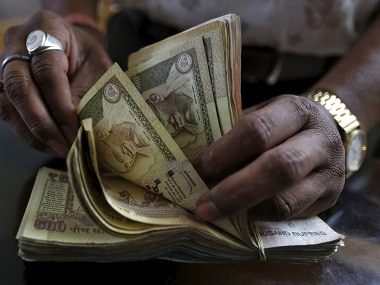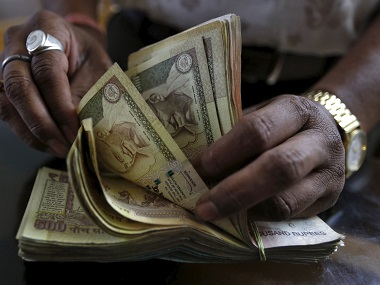On Tuesday, the government informed in Parliament that the total number of wilful defaulters of Public Sector Banks (PSBs) escalated from 5,554 to 7,686 for the period December ‘12-December ‘15 with the amount involved more than doubling to Rs 66,190 crore from Rs 27,749 crore. We already know that there is a ticking time bomb placed by habitual defaulters – promoters with deep pockets with no intent to pay back — on the balance sheets of Indian banks. The Reserve Bank of India (RBI) and the country’s banking industry call them wilful defaulters. [caption id=“attachment_2649448” align=“alignleft” width=“380”]  Representational image. Reuters[/caption] This is precisely what Firstpost warned of in this article some time back. The figure released by the government is not too different. Earlier, on April 1, Firstpost had put out another list of top wilful defaulters of Indian banks that included the names of those with Rs 500 crore exposure. The list included names like Zoom Developers, Winsome Diamonds, Forever Precious Jewellery and Diamonds and, Deccan Chronicle Holdings. Currently, the total amount under the wilful defaulter category constitute about 16 percent of the overall bad loans (Rs 400,000 crore) of Indian banks and about one percent of the total loans (Rs 73 lakh crore) given by the banking sector. Banks have aggressively started reporting bad loans after the RBI set a target of March, 2017 to clean-up their balance sheets. Till then, no one was in a hurry to report NPAs and wilful defaults. Senior bankers themselves admit that the industry has been hiding cases of wilful default. Why do banks love to hide bad assets? The answer is simple: It’s sort of a give and take relation with the large corporations by helping the borrower technically maintain their accounts till the time it is possible. Secondly, state-run banks are always eager to be in the good books of their boss—the government, by showing a healthier-than-real balance sheet. But, the bigger question beyond the naming and shaming debate, is this. Is there a plan of action for the RBI or the banks to recover money from wilful defaulters beyond ‘naming and shaming’? Obviously, the burgeoning list of wilful defaulters shows that these wilful defaulters aren’t really bothered of being ‘named and shamed’ in public. Has the powerful weapon, as once described by Raghuram Rajan, now been reduced to the toy gun of a toddler? Theoretically, wilful defaulters are those who have the ability to pay back the banks but wouldn’t do so deliberately. Ultimately, what matters is to get back the public’s money from these borrowers. According to senior bankers, the recovery from wilful defaulter accounts has been remarkably poor. In other words, the tag of wilful defaulter has proved to be hardly effective when it comes to prodding defaulters for actual repayment. Take the example of the grounded Kingfisher Airlines promoted by liquor-baron Vijay Mallya. Though at least three banks — State Bank of India, Punjab National Bank and United Bank of India — tagged Kingfisher as wilful defaulter (United Bank later withdrew the tag on a court order), there has been no progress yet on the loan recovery process in this case. Mallya owes over Rs 9,000 crore to a host of 17-banks and left the country on March amid investigations and court cases against him on the default case. Banks are still on a wild-goose chase with regard to Mallya. Compared with a normal NPA account, the recovery in wilful defaulter account is even more difficult for banks. Crony promoters are influential in political circles and bureaucracy and have the money power to fight long legal battles. Clearly, the ‘powerful’ weapon of ‘wilful defaulters’ has proved to be powerless when it comes to taking on big tycoons who have openly waged war against banks. Wilful defaulters need to be treated separately from other loan defaulters. This will require coordinated action between the RBI, other sector regulators and the government. The RBI, as the banking regulator, should take the initiative. At present, banks can fight against wilful defaulters in courts, which at times drags on for years. By the time any action can be taken, the value of the underlying asset would have eroded sharply leaving banks with nothing to recover. It’s high time that the government and the RBI came out with a plan of action on how to deal with habitual defaulters, in cases where clearly the intent to pay back is absent. Merely tagging them as wilful defaulters would hardly help when it comes to actual recovery of the money. (Some part of this article was published earlier) Data support from Kishor Kadam
On Tuesday, the government informed in Parliament that the total number of wilful defaulters of Public Sector Banks (PSBs) escalated from 5,554 to 7,686 for the period December ‘12-December ‘15 with the amount involved more than doubling to Rs 66,190 crore from Rs 27,749 crore. We already know that there is a ticking time bomb placed by habitual defaulters – promoters with deep pockets with no intent to pay back — on the balance sheets of Indian banks.
Advertisement
End of Article


)

)
)
)
)
)
)
)
)



